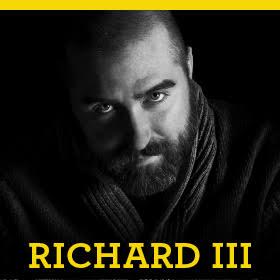Richard III (The Gift Theatre)
By William Shakespeare
Directed by Jessica Thebus
Produced by The Gift Theatre
In Collaboration with The Rehabilitation Institute of Chicago
Playing at the Steppenwolf Garage
Richard is Alive and Raging Against the World
It wouldn’t be a Shakespeare festival without Richard III. The conclusion of a four-part series of history plays, Richard III is the earliest of Shakespeare’s works which his reputation as one of the world’s greatest writers rests on, and features one of his most memorable villainous characters in the title role. It’s also one of his most frequently revived plays, although nearly always in abridged form (as in Oracle’s adaptation at the DCASE theatre last year). Jessica Thebus’s production, which was intended to be shown at the now-defunct Next Theatre, but is being presented by The Gift Theatre at Steppenwolf’s garage, cuts very little, and even adds a little from Henry VI Part 3. The Gift’s artistic director, Michael Patrick Thornton, is a brilliant and unique Richard, and well-worth seeing.
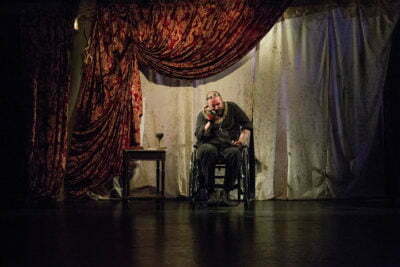
Shakespeare’s historical account is highly biased in favor of the then-ruling Tudor dynasty, whose founder deposed Richard in 1485. The play depicts Richard clawing his way to the throne through a slew of political murders, beginning with his brother, and ending with his child nephews. But Shakespeare also made Richard charismatic, cunning, and delightfully eloquent. In Thebus’s production, we first see him reminiscing on how he helped bring his brother, Edward IV (Adrian Danzig), to power by assassinating Henry VI and slaying his teenage son in battle. Now their family is rejoicing in their successful power-grab, but Richard, who is deformed and despised, feels he will never be valued or tolerated outside a war-setting, and therefore must take power for himself if he is to have any place at all.
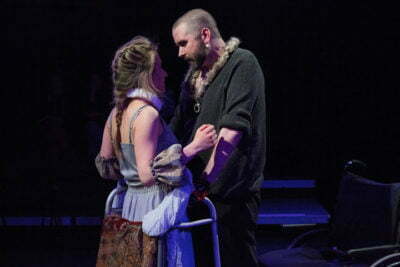
An actor’s physicality is always crucial to their interpretation of the role, and this play’s text makes a major theme of the main character’s disability. Thornton, who has used a wheelchair since suffering a spinal stroke over a decade ago, is a remarkably brutish Richard. In his baggy, open-collar sweater (costumes by Sully Ratke), cargo pants, and pearl earrings, there’s no aristocratic charm about him. While his main tactic for emotional manipulation is brow-beating, his appeals to guilt are more subtle than other Richards’, and he keeps his courtly rivals disorientated by threatening physical confrontations he knows they are obliged to back down from. Thornton’s Richard is usually irritable, and he breaks into full-blown lunacy when his nephews laugh at him. But his mastery of speech never suffers; Thornton’s line delivery is naturalistic and always contains a tone of world-weariness. During his moment of triumph, he walks with the aid of robotic braces activated by a remote on his wrist, and is truly an impressive figure.
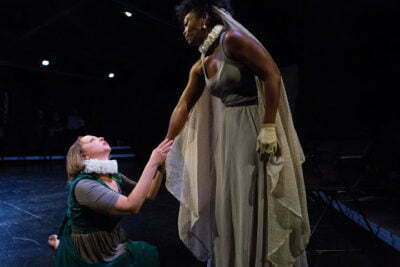
As good as Thornton’s performance is, the play can’t depend entirely on him. A nineteen-member ensemble sounds like a lot, but with the number of characters in Richard III and the way they’re divided up, it feels low. The emotional impact of a character’s betrayal does not increase when we are watching the same actor die for the third or fourth time, and most of them do not display distinguishing personalities. But Keith Neagle is a slippery mini-Thornton as Richard’s ally Buckingham, and Shanésia Davis is appropriately pitiful and wrathful as the deposed Queen Margaret. The time period is left vague, since Richard’s mobility devices are clearly modern, while his weapons are medieval. But the play has no problem establishing itself as its own world.
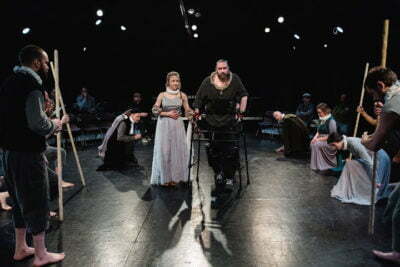
Overall, Jessica Thebus’s production highlights the reasons why Richard III is such an enduring drama, and that reason is mainly Richard himself. Shakespeare wrote some of his best dialogue for him, and it rolls off Thornton’s tongue with as much freshness and power as if new. Sure, building up other characters around him would have made his actions more consequential, and not too many people would have minded some more cuts, since the show currently is about two and a half hours long. But seeing the play in its full form allows us to delve more into Richard’s character, and setting us inside his point-of-view allows Thornton’s distinct take on him to inform the entirety of the show’s action. Fans of Shakespeare will be glad to see what discoveries are awaiting them.
Recommended
Jacob Davis
[email protected]
Reviewed March 11, 2016
Playing at the Steppenwolf Garage, 1624 N Halsted Ave, Chicago. Tickets are $30-40; to order, call 312-335-1650 or visit Steppenwolf.org. Playing through May 1. Running time is two hours and thirty minutes, with one intermission.

